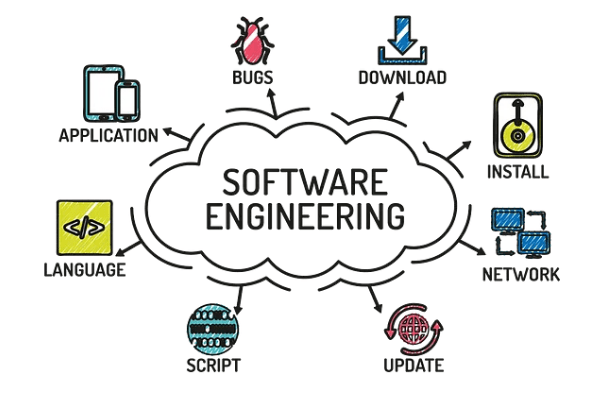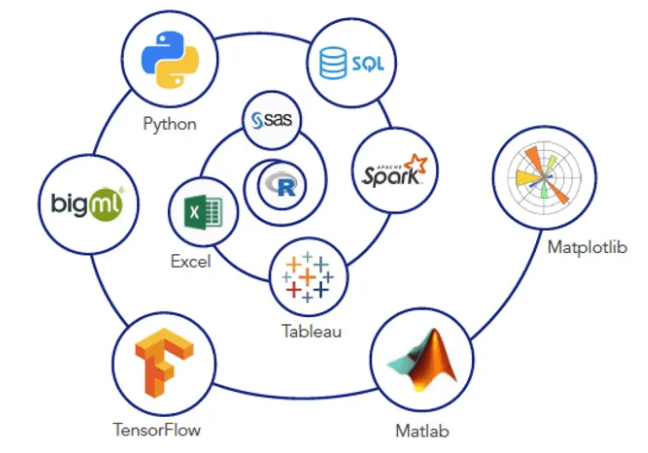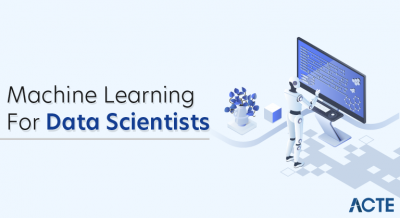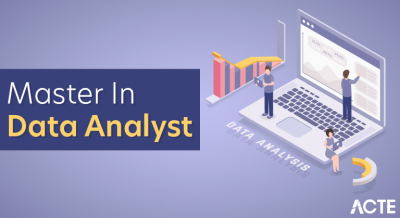
- Introduction to Data Science and Software Engineering
- Key Differences Between Data Science & Software Engineering
- Required Skills for Each Career Path
- Tools and Technologies Used in Both Fields
- Career Growth Opportunities: Which is Better?
- Salary Comparison: Data Science vs Software Engineering
- Which Field is More in Demand?
- Job Market Trends and Future Scope
Introduction to Data Science and Software Engineering
Data Science and Software Engineering are two pivotal fields driving innovation in today’s digital world, each playing distinct but complementary roles in technology development. Data Science involves extracting insights and knowledge from data through techniques such as statistical analysis, machine learning, and data visualization. Data scientists collect, clean, and analyze vast datasets to identify patterns and trends that inform business decisions. This multidisciplinary field combines computer science, statistics, and domain expertise to solve complex problems, often using tools like Python, R, and SQL. Its applications span industries including finance, healthcare, marketing, and e-commerce, helping organizations optimize operations, predict outcomes, and create personalized experiences, which are all covered in Data Science Training. Software Engineering focuses on designing, developing, testing, and maintaining software systems. Software engineers apply principles of computer science and engineering to build reliable, efficient, and scalable applications. They work with programming languages such as Java, C++, and JavaScript to create software that powers everything from mobile apps to large-scale enterprise systems. Their responsibilities also include software architecture, quality assurance, and deployment, ensuring that software meets user needs and performs well in production environments. While data scientists analyze data to generate insights, software engineers build the tools and platforms that enable those analyses. Together, these fields fuel technological progress and innovation in the modern economy.
Are You Interested in Learning More About Data Science? Sign Up For Our Data Science Course Training Today!
Key Differences Between Data Science & Software Engineering
Data Science and Software Engineering are closely related but focus on different aspects of technology and problem-solving.Data Science centers around analyzing and interpreting complex datasets to derive actionable insights. Data scientists use statistical methods, machine learning, and data visualization to uncover patterns and predict outcomes. Their work involves data cleaning, model building, and communicating results to stakeholders to support data-driven decisions, often using Top Python Libraries For Data Science. They rely heavily on tools like Python, R, SQL, and specialized libraries such as TensorFlow or Scikit-learn. The role is inherently exploratory and analytical, requiring strong knowledge of statistics and domain expertise. In contrast, Software Engineering focuses on designing, developing, and maintaining software applications and systems. Software engineers apply engineering principles to write, test, and optimize code that runs software products.

Their work involves architecture design, coding in languages like Java, C++, or JavaScript, debugging, and collaborating in development teams. Software engineering emphasizes creating robust, efficient, and scalable software solutions. While data scientists extract meaning from data to influence business strategies, software engineers build the tools and infrastructure that enable these analyses or power user-facing applications. Data science is more research and analysis-driven, whereas software engineering is development and implementation-driven. Both fields require strong programming skills but differ in focus, tools, and daily tasks, making them distinct yet complementary professions.
Required Skills for Each Career Path
- Programming Proficiency: Expertise in languages like Python, Java, C++, and SQL depending on the role.
- Mathematics & Algorithms: Strong foundation in statistics and linear algebra for data scientists; algorithms and discrete math for software engineers.
- Data Handling: Ability to work with large datasets, data cleaning, and database management.
- Problem-Solving Skills: Analytical thinking to solve complex technical challenges is essential for understanding What is Logistic Regression.
- Machine Learning & AI: Essential for data scientists; beneficial for software engineers working on intelligent systems.
- Software Development Practices: Knowledge of version control, testing, debugging, and collaborative workflows.
- Communication Skills: Clear explanation of technical concepts to both technical teams and non-technical stakeholders.
- Python is a versatile programming language extensively used by both data scientists and software engineers. Its simplicity and rich ecosystem of libraries make it ideal for data analysis, machine learning, and software development.
- SQL remains a fundamental technology for managing and querying databases. Professionals in both fields rely on SQL to extract, manipulate, and analyze data stored in relational databases efficiently.
- Git is the standard version control system that facilitates collaborative coding, an important skill taught in Data Science Training.
- Docker is widely adopted to create consistent, containerized environments. This ensures that applications and data science models run reliably across different systems, streamlining deployment and collaboration.
- Jupyter Notebooks provide an interactive environment primarily favored by data scientists for exploratory data analysis and visualization, but software engineers also use it for prototyping and sharing code snippets.
- Cloud Platforms such as AWS, Microsoft Azure, and Google Cloud offer scalable infrastructure and tools for hosting applications, processing big data, and deploying machine learning models, making them indispensable in both domains.
- Integrated Development Environments (IDEs) and code editors like Visual Studio Code, PyCharm, and IntelliJ support efficient coding, debugging, and project management, enhancing productivity for data scientists and software engineers alike.
- Average Salary Range: Data scientists generally earn between $85,000 and $140,000 annually, while software engineers typically range from $80,000 to $130,000, depending on experience and location.
- Entry-Level Salaries: Entry-level data scientists often start with slightly higher salaries than software engineers due to the specialized analytical skills required.
- Industry Influence: Salaries in both fields vary widely by industry; finance and tech companies tend to offer the highest pay for both roles.
- Location Impact: Salaries are significantly higher in tech hubs like San Francisco, Seattle, and New York for both data scientists and software engineers due to demand and cost of living, where Python Generators are often used to optimize performance.
- Experience Factor: With 5+ years of experience, both data scientists and software engineers can see salaries rise to over $150,000, with data scientists sometimes commanding a premium for specialized skills.
- Bonus and Stock Options: Software engineers often receive higher bonuses and equity, especially at startups and large tech firms, which can increase total compensation substantially.
- Career Growth Potential: Both fields offer strong salary growth, but software engineers may have a broader range of roles (e.g., DevOps, architecture) that can influence earning potential differently.
To Explore Data Science in Depth, Check Out Our Comprehensive Data Science Course Training To Gain Insights From Our Experts!
Tools and Technologies Used in Both Fields

Career Growth Opportunities: Which is Better?
Both data science and software engineering offer strong career growth opportunities, but the paths differ based on skills, interests, and industry demands. In data science, career progression often moves from entry-level data analyst or junior data scientist roles to senior data scientist, machine learning engineer, and eventually to leadership positions like data science manager or chief data officer. The field’s rapid evolution means there’s continuous opportunity to specialize in areas such as AI, deep learning, natural language processing, or big data engineering. Data scientists who combine strong technical skills with business acumen are especially valued, leading to roles that influence strategic decision-making at the highest levels, where expertise in Python vs R vs SAS plays a crucial role. Software engineering also provides diverse advancement options. Starting as junior developers, professionals can progress to senior engineer, tech lead, and software architect roles. Many software engineers transition into product management, DevOps, or engineering management. The broad applicability of software skills across industries ensures steady demand and opportunities to work on cutting-edge technologies such as cloud computing, cybersecurity, and embedded systems. Ultimately, the better career growth depends on your passion and skill set. Data science offers rapid specialization and strategic influence, while software engineering provides broader versatility and a range of technical and leadership roles. Both fields are poised for continued expansion, making either a strong choice for long-term career development.
Want to Pursue a Data Science Master’s Degree? Enroll For Data Science Masters Course Today!
Salary Comparison: Data Science vs Software Engineering
Which Field is More in Demand?
Both data science and software engineering are highly sought-after fields in today’s technology-driven job market, but their demand varies based on industry trends and organizational needs. Software engineering has traditionally been in strong demand due to the constant need for building, maintaining, and improving software applications across virtually every sector. As companies digitize operations and launch new products, skilled software engineers remain critical for driving innovation and ensuring robust, scalable systems. On the other hand, data science has experienced explosive growth over the past decade as organizations recognize the value of data-driven decision-making. The demand for data scientists is fueled by increasing amounts of data generated daily and the need to extract meaningful insights from this information, highlighting Why Data Science Matters & How It Powers Business Value. Industries such as finance, healthcare, e-commerce, and marketing heavily invest in data science talent to gain competitive advantages through predictive analytics and AI. While software engineering continues to offer a broader range of job opportunities due to its foundational role in technology, data science demand is rapidly expanding and sometimes harder to fill due to its specialized skill set. Overall, software engineering currently commands a larger volume of job openings, but data science is growing faster, signaling strong future demand as more businesses prioritize analytics and machine learning capabilities. Choosing between the two should depend on your interests and strengths, as both fields offer excellent career prospects.
Preparing for a Data Science Job Interview? Check Out Our Blog on Data Science Interview Questions & Answer
Job Market Trends and Future Scope
The job markets for data science and software engineering are both experiencing dynamic growth, influenced by technological advancements and shifting industry needs. Data Science is witnessing unprecedented demand. The U.S. Bureau of Labor Statistics projects a 27.9% increase in jobs requiring data science skills by 2026, significantly outpacing the average for all occupations. Globally, the data science market is expected to grow from $95.3 billion in 2021 to $322.9 billion by 2026. In India, the data science industry is projected to reach approximately $11 billion by 2026, reflecting a compound annual growth rate (CAGR) of around 28% from 2021 to 2026, driving increased demand for Data Science Training. This surge is driven by increased data generation, the rise of artificial intelligence (AI), and a growing demand for data-driven decision-making across various sectors such as finance, healthcare, retail, and e-commerce. Software Engineering remains foundational to technological infrastructure. The global engineering software market size was estimated at USD 43.03 billion in 2024 and is projected to grow at a CAGR of 20.3% from 2025 to 2030. However, the integration of AI tools is reshaping roles within the field. Companies are leveraging AI to automate coding tasks, leading to increased productivity but also raising concerns about job displacement and evolving skill requirements. Both fields offer robust career prospects, with data science experiencing rapid expansion and software engineering adapting to technological innovations.





